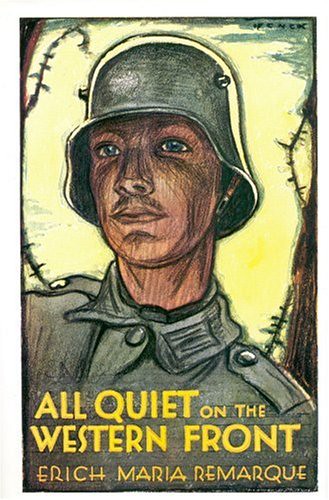The Children of Cain
This post consists of an excerpt from chapter nine of All Quiet On The Western Front by Erich Maria Remarque.
Remarque was a German veteran of World War I. (He later became an American citizen.) Remarque published All Quiet On The Western Front in 1929. It sold two and half million copies in the first eighteen months. Some have describe it as the most honest account of war ever written. German soldiers would simply say of Remarque’s book, “So ist es gewsen!” (That’s the way it was!)
And if you ask me what this post has to do with Holy Week, I will simply answer, much!
Read it thoughtfully.
I have entitled this excerpt as…
The Children of Cain Have a Conversation Concerning the Legacy Bequeathed Them.
______________________________
“It’s queer, when one thinks about it,” goes on Kropp, “we’re here to protect our father land. And the French are over there to protect their fatherland. Now, who’s in the right?
“Perhaps both, “ say I, without believing it.
“Yes, well now,” pursues Albert, and I see that he means to drive me into a corner, “but our professors and pastors and newspapers say that we are the only ones that are right, and let’s hope so; — but the French professors and pastors and newspapers say that the right is on their side, what about that?”
“That I don’t know,” I say, “but whichever way it is there’s war all the same and every month more countries are coming in.”
Tjaden reappears. He is still quite excited and again joins the conversation, wondering just how a war gets started.
“Mostly by one country badly offending another,” answers Albert with a slight air of superiority.
Then Tjaden pretends to be obtuse. “A country? I don’t follow. A mountain in Germany cannot offend a mountain in France. Or a river, or a wood, or a field of wheat.”
“Are your really as stupid as that, or are you just pulling my leg?” growls Kropp. “I don’t mean that at all. One people offends the other—”
Then I haven’t any business here at all,” replies Tjaden. “I don’t feel myself offended.”
“Well, let me tell you,” says Albert sourly, “it doesn’t apply to tramps like you.”
“Then I can be going home right away,” retorts Tjaden, and we all laugh.
“Ach, man! he means the people as a whole, the State—” exclaims Müller.
“State, State”—Tjaden snaps his fingers contemptuously. “Gendarmes, police, taxes, that’s your State;—if that’s what you are talking about, no thank you.”
“That’s right,” says Kat, “you’ve said something for once, Tjaden.
State and home-country, there’s a big difference.”
“But they go together,” insists Kropp, “without the State there wouldn’t be any home-country.”
“True, but just you consider, almost all of us are simple folk. And in France, too, the majority of men are laborers, workmen, or poor clerks. Now just why would a French blacksmith or a French shoemaker want to attack us? No, it is merely the rulers. I had never seen a Frenchman before I came here, and it will be just the same with the majority of Frenchmen as regards us. They weren’t asked about it any more than we were.”
“Then what exactly is the war for?” asks Tjaden.
Kat shrugs his shoulders. “There must be some people to whom the war is useful.”
“Well, I’m not one of them,” grins Tjaden.
“Not you, nor anybody else here.”
“Who are they then?” persists Tjaden. “It isn’t any use to the Kaiser either. He has everything he can want already.”
“I’m not sure about that,” contradicts Kat, “he has not had a war up till now. And every full-grown emperor requires at least one war, otherwise he wouldn’t become famous. You look in your school books.”
“And generals too,” adds Detering, “they become famous through war.”
“Even more famous than emperors,” adds Kat.
“There are other people back behind there who profit by the war, that’s certain,” growls Detering.
“I think it is more a kind of fever,” says Albert. “No one in particular wants it, and then all at once there it is. We didn’t want war, the others say the same thing—and yet half the world is in it all the same.”
“But there are more lies told by the other side than by us,” say I; “just think of those pamphlets the prisoners have on them, where it says that we eat Belgian children. The fellows who write that ought to go and hang themselves. They are the real culprits.”
Müller gets up. “Anyway, it is better that the war is here instead of in Germany. Just look at those shell-holes.”
“True,” assents Tjaden, “but no war at all would be better still.”
______________________________
Rejoice greatly, O daughter of Zion!
Shout aloud, O daughter of Jerusalem!
Behold, your king comes to you
Triumphant and victorious is he
Humble and riding on a donkey
On a colt, the foal of a donkey
He will cut off the chariot from Ephraim
And the war-horse from Jerusalem
The weapons of battle will be cut off
He shall command peace to the nations
His dominion shall be from sea to sea.—Zechariah 9:9, 10
May you have a blessed Holy Week.
BZ
